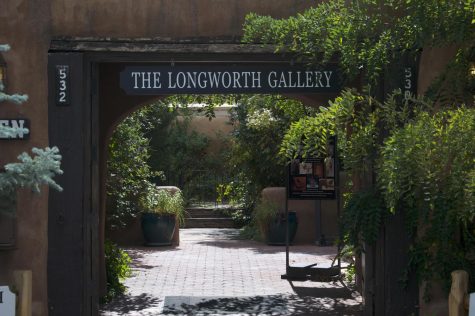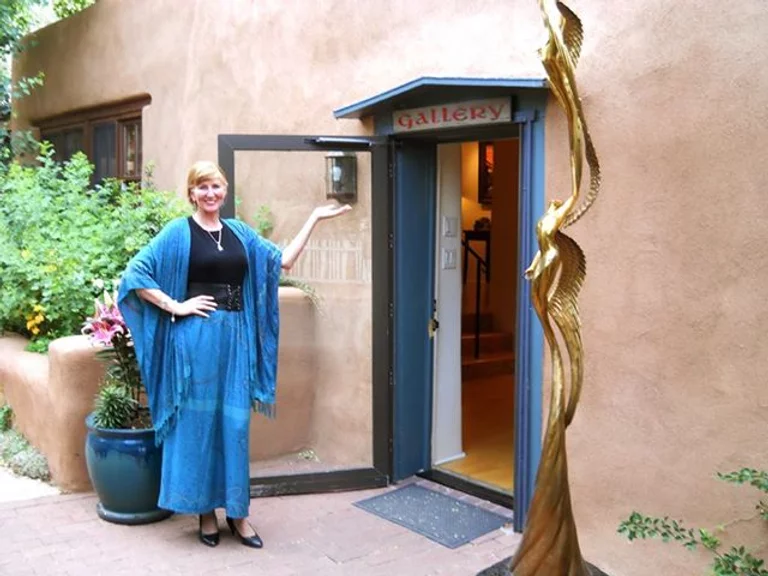Courtesy of The Longworth Gallery Website
532 Canyon Road displays metaphorical realism: truth with a hint of something magical.
The Pagan Equestrian…A Conversation With Lisa Rodgers of Canyon Road
Banana hammocks, butterfly ships, egg yolk sunrises—I wandered into The Longworth Gallery last June. The story of an English woman who came to New Mexico out of a love for art and curated a whimsical gallery in one of the largest art hubs in America—this is what I had expected to hear in my interview with her this past September. But, if I’ve learned anything from this endeavor, expect the unexpected.
Most galleries on Canyon Road display gorgeous art. Filled with burnt oranges and mellow blues, the landscape of our home state fills just about every last one. In The Longworth Gallery, there’s a different kind of gorgeous: jesters, and kaleidoscopes, and personified leaves—and, standing among them, a living work of art.
I sat down with Lisa Rodgers, the owner and curator of one of the most stunning art galleries in Santa Fe, expecting a thirty-minute conversation on art, New Mexico, and the life of a gallery owner on the infamous Canyon Road. What ensued was a ninety-minute tale of love, light, darkness, politics, education, identity, and (very importantly) horses. Everything, the title of the recording on my phone reads. It was a conversation of everything.
Nothing is as it seems with Lisa Rodgers, yet she is entirely straightforward. It’s all clear to her. Who she is, what she believes, why she believes it—few of us know these things about ourselves to begin with, but to articulate it the way she does, that’s a rarity of its own. She told me to call her Lisa, so, Lisa it is.
Lisa tells her story best, that’s for sure. Captivating and uncensored, her words cut through the air with their energy reflecting in her eyes. If I tell this story wrong, she will let me know—of this I am certain. Even so, I must attempt to share it with you.
Lisa came to Santa Fe on a three-month contract…thirty-four years ago. She didn’t particularly care about the art. Georgia O’Keeffe does not interest her. Santa Fe’s museums do not interest her. She’s a circuitous pagan, dinosaur, and an avid equestrian—all by her own decree and all of which I will examine further in the later workings of this piece. Her life is a saga. Her wit is epic.
Born in Oxford, England, Lisa was adopted at age one by the woman of women. “Lady Longworth” her mother was called, a matriarch of love, razor-sharp honesty, and stilettos. Raised by a single parent, she was brought up in a world of morality, truth, and elegance. Lisa lost her mother tragically in a house fire in 1986. “She succumbed to the flames,” Lisa told me.
“Instead of putting a gun in a dysfunctional child’s hands, give them a crayon. Let them express,” Lisa advised me. When darkness intruded upon her childhood, she didn’t cope with a crayon. For her, it was ponies.
Lisa grew up next to Port Meadow, traipsing by the River Thames. “Happiest days of my life,” she recalls. Her childhood took a dark turn in primary school, and it was after she attempted suicide as a child that she dedicated her life to ponies. She “made a deal with energy,” vowing: “give me horses all my life and I will try to be the best person I can be.” She’s had horses ever since.
Lisa has no high school education. Kicked out of school, she entered the workforce at nine years old. The key to her career lies in a simple statement by the woman herself: “I don’t suffer fools.” And she doesn’t. She likes the responsibility, the final call, to lie with her.
She wanted freedom, and she wanted animals—she was told to go “out West.” Lisa packed up her truck and drove cross country to Clovis. “My life was horses, and that’s a microcosm.”
Her work brought her to Santa Fe where she got a contract as head trainer of a private breeding farm. From there she opened her own breeding and training facility for teaching and boarding. She retired from the horses in 2002.
Lisa’s journey with the gallery began in 2006. She was hired on the spot by the previous owner of 532 Canyon Road with the sentence I’ve been waiting for you lingering in the air. Working up through the ranks, she became owner in 2013. She’s been here ever since. “This gallery will only represent light, love, and optimism.” This she stands by.
I first asked her to tell me two things: who she is and what she does. To the latter, she replied: “As little as possible and get away with it,” before answering, “I greet, I introduce, and hopefully get my guest to thoroughly enjoy and appreciate my artists.”
Lisa likes intellectual art, art that’s “tactile, something tangible, as well as visual, sometimes functional.” Her gallery displays metaphorical realism: “cerebral dimension on top of visual aesthetic,” she calls it, “That’s what I admire about my artists, there’s an intellect behind their work.” It’s something she can “bite and get [her] teeth into,” as she puts it. A painting of horses galloping across a meadow is nice, she explained to me, but what then?
Lisa’s job is to be a vehicle for the artists she very specifically displays, to help guests understand where the art comes from emotionally and psychologically. Artists rely on their representatives, Lisa told me, and count on them “standing in for them and speaking accurately on their behalf. It takes a lot of trust, mutual respect, and knowledge on the part of the representative.” She doesn’t carry all of her artists’ work in the gallery. Their work is all available on the gallery website, what she loves goes in the gallery—a distinction she pointedly made.
“I believe people go into galleries to appreciate the gifts and talents of others,” Lisa told me. “I could talk to you for 30 minutes about this oil painting behind you. At the end of the 30 minutes, you’d really appreciate it and think I understand it. I can look at it with fresh eyes, and I still don’t like it, and I still wouldn’t have it. And that’s okay. My work is done.”
“There’s little that’s right or wrong,” Lisa described. “I say it is wrong if I look at it and say I could have done that…Even if people don’t like this kind of art, it cannot be argued. In other words, this person has a skill, whether you care for the imagery or not.” Pointing to a Vladimir Kush piece hanging above her desk: “I can’t draw a trampoline that looks like an ocean floor. There’s no arguing there’s a gift, talent, discipline, preciseness, and technical ability. The rest becomes secondary.”
Our homes are sanctuaries, Lisa explained to me. “In theory, they’re the only dwelling where we can lock the front door and tell the world go take a hike. We will turn that dwelling into a home by adorning it with things that make us smile, make us happy, make us good.” We curate our spaces because at the end of it all, when all the bills are paid and responsibilities are taken care of, it’s that painting or trinket or blanket that makes us happy and fulfilled. This is what Lisa does, she says. She helps people make their homes—helps them find something that fits for them.
Her work, as she put it, is to introduce people to this type of art. Whether they like it or not is entirely personal. “To love art doesn’t mean you have to be an expert in it,” she said, but you do have to be open to it.
Be open to art—be open to her. “I’ve never bent to society accepting me. I have personally forged my own path.” Lisa is a pagan. Nature means quite a lot to her. She doesn’t own an iPhone. She lives happily in the past (her words not mine). She’s a feminist and a fierce debater. There are, inevitably, gaps in my understanding of her story, but what I do know is this: Lisa is a person who will talk for twenty minutes upon being asked her favorite piece in the gallery and somehow spin her answer into a speech on gun control, abortion rights, pubs, and the history of the English church. She’s unique. She’s extraordinarily interesting. She’s a work of art.
So, here’s this woman. This woman who speaks in fabulous absolutes, who believes so deeply in the value of respect, in being able to disagree with one another, in fixing the education system, in women’s rights, in fighting off the overwhelming bigotry overtaking the world, in peace and chivalry and power. She owns a gallery. She works, sleeps, eats. There are things that are deeply meaningful to her, and things she dismisses immediately with one graceful wave of her hand. I knew nothing about her, but I thought I did. Now I still know nothing about her, and I know better than to think I do.
“Listen. Speak too, but listen,” Lisa answered me. I asked her what advice she has for young women like myself.
Lisa, I tried my best.

